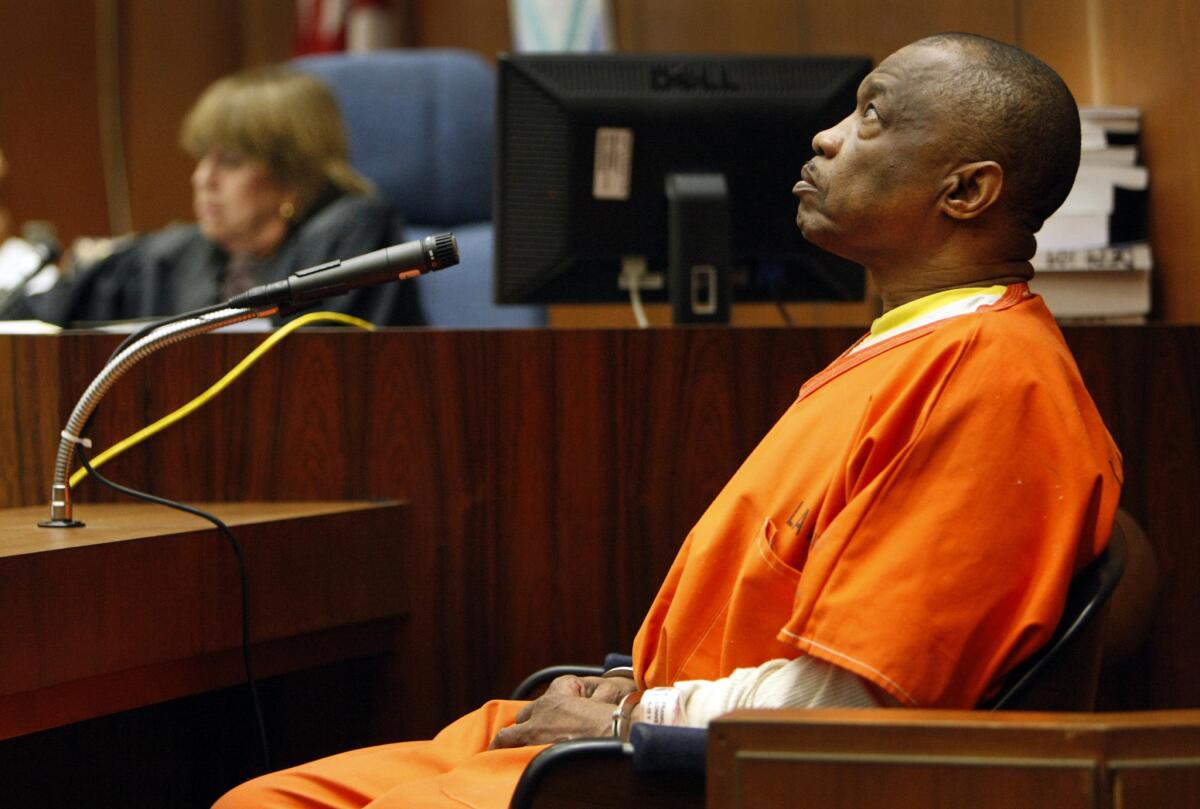Grim Sleeper: Judge allows DNA evidence gathered at restaurant

A judge on Tuesday ruled that DNA evidence that led to alleged Grim Sleeper serial killer Lonnie Franklin Jr. was lawfully obtained via plates and utensils seized by a police officer who posed as a restaurant busboy.
Appearing on the stand for the first time, Franklin testified that he was attending a birthday party that day in July 2010 at John’s Incredible Pizza in Buena Park with one of his employees and her three daughters when the DNA evidence was gathered.
Days later on July 7, he was arrested by Los Angeles police.
MAP: Grim Sleeper killings, 1985-2007
Franklin’s attorneys, Seymour Amster and Louisa Pensanti, had argued that the busboy cleared their client’s plates before he had finished — first a pizza and then a chocolate cake — and therefore were taken illegally. The attorneys also argued that Franklin had a reasonable expectation that his plates would be thrown into a pile with others, and so his DNA would never be able available for testing.
“I felt it would be mixed with the rest of the trash,” Franklin said on the stand, drawing sighs of frustration from victims’ families in the courtroom.
Los Angeles County Superior Court Judge Kathleen Kennedy rejected the defense’s argument, calling it “specious and ridiculous.” She said she couldn’t believe a reasonable person, not knowing he was under surveillance, would ever think about what happens to his leftovers and used plateware.
MAP: Serial killers in South L.A.
“If he were really concerned about such things, he would not eat or he would take his trash with him,” Kennedy said.
Frustrated by their inability to find the Grim Sleeper, whose DNA was not in a law enforcement database, Los Angeles police asked the state to look for a DNA profile similar enough to be a possible relative of the killer.
State computers produced a list of 200 genetic profiles of people in the database who might be related to the alleged serial killer. Among the top five ranked as the most likely relatives was a profile that shared a common genetic marker with the crime-scene DNA at each of 15 locations that the crime lab examined.
Scientists knew that a profile with that sort of matching pattern indicated a parent-child relationship.
To winnow the candidates further, and knowing that their suspect had to be a man, they tested the DNA of the 200 offenders whose profiles resembled the crime-scene DNA to determine if any appeared to share the Y chromosome, which boys inherit from their fathers.
That test produced one match, and it was the same profile that had shared all 15 markers on the first round of testing.
The judge would not allow prosecutor Beth Silverman to question Franklin about anything besides listing his prior convictions and the time he spent at the pizza buffet. Franklin, appearing in an orange jumpsuit, has been previously convicted of grand theft auto, assault, battery and receiving stolen property.
Franklin faces charges of killing 10 women over a period spanning more than two decades. He has been held without bail since his arrest. He is also charged with the premeditated attempted killing of an 11th victim.
Franklin, who is scheduled to stand trial this summer, is due back in court on Jan. 21 as attorneys on both sides continue to battle over evidence to be allowed at trial.
Twitter: @peard33
More to Read
Sign up for Essential California
The most important California stories and recommendations in your inbox every morning.
You may occasionally receive promotional content from the Los Angeles Times.










